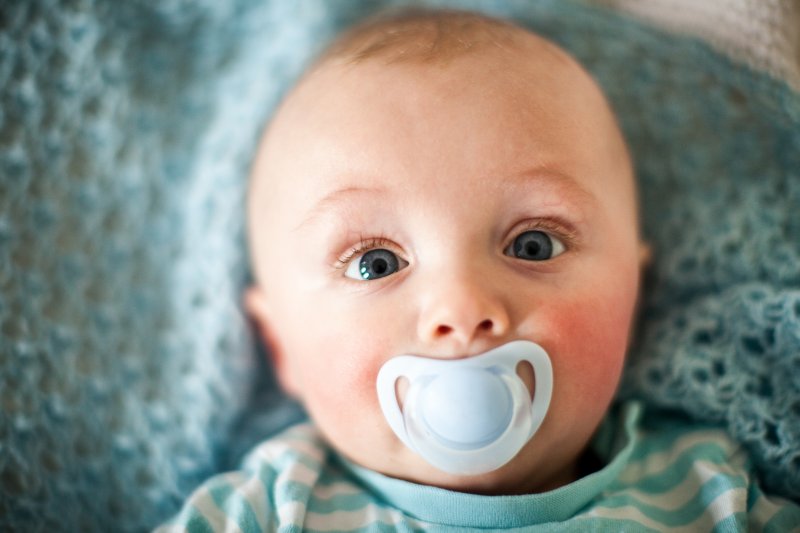
You’ve fed the baby but he’s still fussy. You may not hesitate to pop a pacifier in his mouth to comfort and calm him – unless you’ve heard some buzz about the risks of baby binkies. Desperate times call for good information. Your dentist for infants in Bergenfield wants to help you avoid desperate measures by knowing the pros and cons of pacifiers.
What are the benefits of pacifier use?
Good news! Pacifiers are not only great at calming your baby down, a number of studies show they can also help:
- Prevent Sudden Infant Death Syndrome (SIDS)
- Ease stress for moms with postpartum depression
- Distract your baby from painful and stressful situations
- Improve preemies’ digestion and overall thriving
- Teach babies to self-soothe
What are the risks of pacifiers?
Studies show that pacifier use risks may include:
- Dental problems
- Potential weight gain
- Pacifier addiction
- Higher incidence of ear infections
How does a pacifier cause dental problems?
Prolonged pacifier use can cause malformation of your baby’s mouth, resulting in the need for orthodontics later. The most common issues are overbites (where the top teeth extend out further than the bottom), underbites (where some or all of the top teeth fit inside the bottom teeth), and crossbites (where teeth are tilted).
Heredity and delayed development of teeth can also play a role, but thumb sucking and pacifier use often exacerbate the condition, especially with prolonged use.
How long is too long to allow my infant to use a pacifier?
Fortunately, most of the concerns dentists have about pacifiers applies to frequent and prolonged use.
Keep in mind these guidelines:
- Malformation of the mouth often occurs from pacifier use between the ages of 2 and 4.
- Restrict pacifier use to specific times. If allowed to use their binkie all day, the self-soothing benefit can become addictive.
- While it can be a challenge at any age to wean a child from the pacifier, the transition is generally smoother when they’re between 6-12 months than when they’re toddlers and have had more time to grow attached to it.
- From a dental perspective, the only real advantage of a pacifier over thumb sucking is that you can take the pacifier away. But there’s no guarantee they won’t then resort to thumb or finger sucking.
What if my child is already addicted to the pacifier?
If you’re concerned about your baby’s attachment to the pacifier and the effects it may be having, his or her dentist can make recommendations that will put your fears to rest. Children should see the dentist by their first birthday if they use a bottle at night and by age 2 if they don’t, which is before misalignment issues will have started.
If the dentist sees that misalignment issues have already started, treatments are available to get their development back on track as soon as possible.
About the Author
At Smile More Kidz, your child’s experience is not only gentle, it’s fun! Dr. Tong, Dr. Mendia, Dr.Reff and Dr. Sunkin love kids and know how to keep them smiling. They’ve donated more than $150,000 in dental work to children and adults in Bergenfield and around the world, and they’re passionate about helping parents learn how to care for their children’s dental needs. Call (845) 859-6060 to find out more about their Toddler Thursdays.
